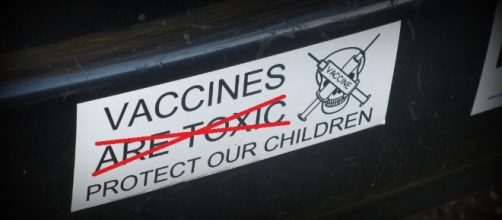Alex Berezow at Asch suggested that the anti-gmo movement and the anti-vaccination movement are one in the same. At the very least the two groups are linked ideologically and are primarily comprised of the same people.
Individuals who oppose genetically modified organisms, mainly food crops that have been enhanced for yield, resistance to pests, or even nutrition believe that such plants have unspecified and unknown dangers. They think GMOs should either be banned or at the very least labeled so that consumers, no doubt pumped up by anti-GMO propaganda, can choose not to purchase them.
Indeed, some companies already freely advertise their products as “non-GMO” as a way to attract the organic food crowd.
The anti-vaccination movement was sparked by a now discredited article in the British medical journal Lancet that linked some vaccinations to autism in children. The article in question was later repudiated by the journal when it was revealed that its author was paid off by a group of trial lawyers and that the studies that piece was allegedly based on were dodgy to put matters politely.
Nevertheless, far too many parents in the United States, many of them hip, left-leaning millennials, are denying their children vaccines and are allowing them to go through many of the ancient Childhood Diseases that were once all but eradicated.
An outbreak of measles among a Somali refugee community in Minnesota has been blamed on anti-vaxxer propaganda.
The old childhood diseases were no joke. Measles resulted in days of suffering for children who caught the disease with complications such as blindness and death for a few. The disease still ravages the developing world. The mumps causes painful swelling of the parotid salivary glands and can put sufferers out of school or work from a few days to weeks. While Chickenpox is rarely fatal, it can cause severe damage to the fetus if caught by a pregnant woman.
The one thing that anti-GMO people and anti-vaxxers have is the belief that natural is better. The concept defies common sense and suggests a denial of science with profound implications for public health.
The opposition to golden rice, a specially modified food crop designed to prevent blindness and death among children in the developing world who lack dietary vitamin A, is an example of anti-science hysteria. Of course, the resurgence of childhood diseases because of the refusal of some parents to vaccinate their children is becoming an increasingly serious problem.
The only counter to these twin but related hysterias consist of calm, reasoned education concerning the benefits of GMOs and vaccination. The education campaign should be evidence based and not arguments based on authority. People armed with accurate information tend to do the right thing.

